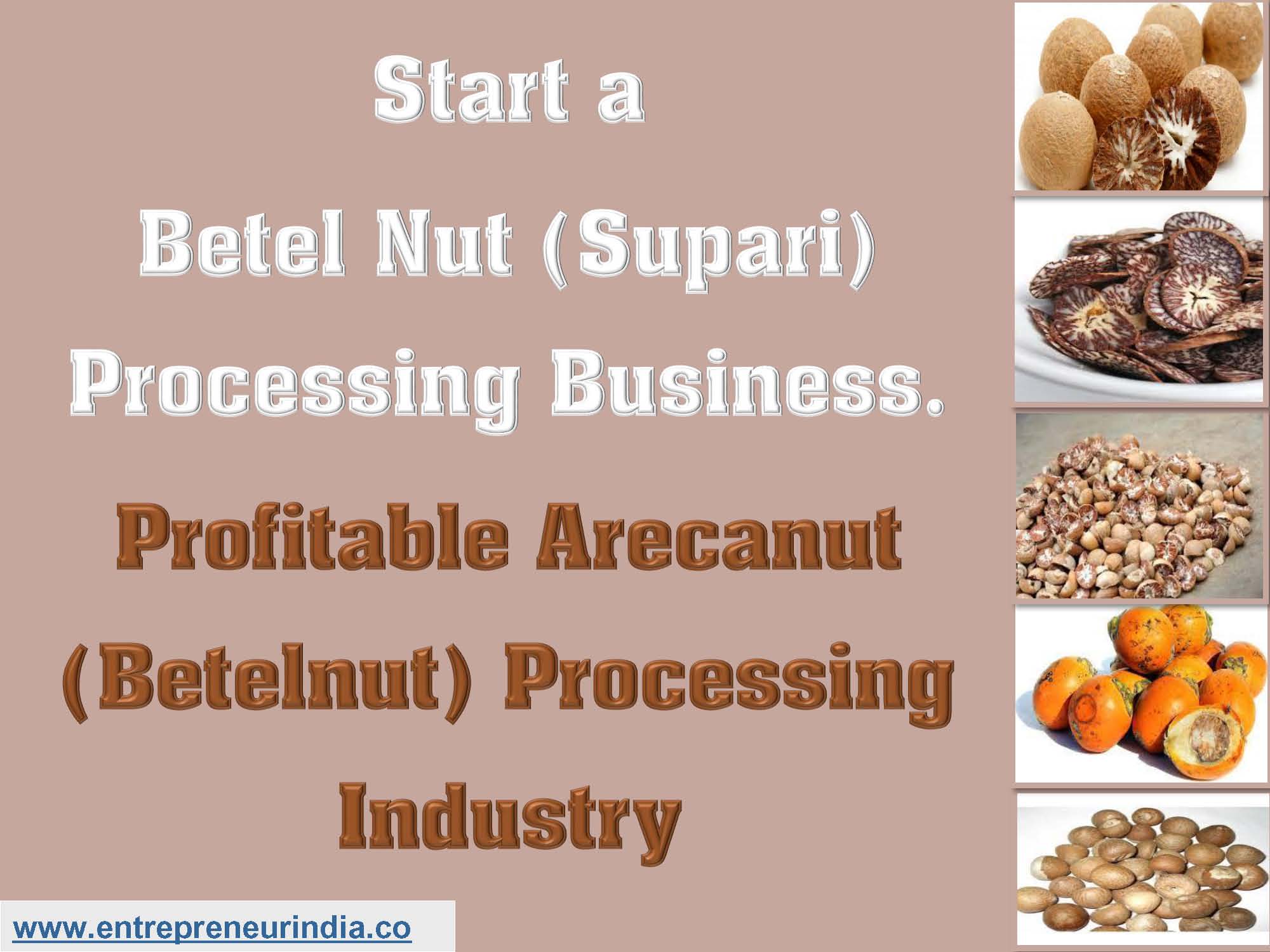
If you’re looking to enter a traditional and profitable agro-based industry, it’s time to start a Betel Nut processing business. Betel Nut, also known as areca nut, is widely consumed in India and Southeast Asia in various processed forms—supari, scented supari, gutkha base, and pan masala mix. With a consistently high demand in both rural and urban areas, entrepreneurs can start a Betel Nut processing business to generate sustainable income while adding value to a readily available raw agricultural product.
Understanding the Betel Nut Market
The decision to start a Betel Nut processing business is backed by the product’s deep cultural roots and high consumption rate in India, Bangladesh, Nepal, and parts of Southeast Asia. India is one of the largest producers and consumers of Betel Nut, making it an ideal base for setting up processing units. As the nut is used in various forms—raw, boiled, dried, flavored, and roasted—it offers scope for product variety, regional customization, and brand development.
The demand for premium-quality processed supari is growing in urban markets, where packaging, hygiene, and flavor profile make a big difference in consumer choice. This allows entrepreneurs to position their brand differently even in a saturated market.
Types of Betel Nut Processing
When you start a Betel Nut processing business, you can choose from several processing methods:
1. Boiled Supari: Nuts are boiled and dried to enhance shelf life and create a soft chewable texture.
2. Dried Supari (Chali): Sun-dried whole nuts are cut into thin slices and packed raw or roasted.
3. Flavored Supari: Processed slices are coated with sugar, menthol, spices, or cardamom for use in pan masala.
4. Masala Supari: Prepared by mixing with saffron, silver leaf (varak), or special aromatic blends.
5. Roasted Supari: Dried slices are roasted for enhanced taste and shelf life.
Each variant caters to different regional tastes and age groups, offering wide market penetration if you start a Betel Nut processing business with a diverse product line.
Raw Materials and Machinery Required
To start a Betel Nut processing business, you need access to quality raw areca nuts sourced from Kerala, Assam, Karnataka, or North-Eastern states. In addition, you’ll require:
-
Betel Nut cutting machines (manual or automatic)
-
Roasting pans or driers
-
Flavor mixing drums
-
Polishing and grading machines
-
Weighing and sealing machines
-
Hygienic packaging material (pouches, jars, boxes)
A small unit can be start with basic machinery under ?5 lakhs, while an automated plant may require ?10–25 lakhs depending on scale and quality expectations.
Processing Flowchart
Here’s a simplified workflow to start a Betel Nut processing business:
-
Procurement of raw nuts
-
Cleaning and sorting
-
Cutting into uniform pieces
-
Drying or roasting
-
Flavor mixing (optional)
-
Polishing and grading
-
Packing and labeling
The process can be modified based on your product line—raw, flavor, or premium aromatic supari.
Regulatory and Legal Considerations
Before you start a Betel Nut processing business, obtain the following:
-
FSSAI license (Food Safety and Standards Authority of India)
-
GST registration
-
Factory license or Udyam registration (for MSME benefits)
-
Trademark for brand protection
-
Pollution control board NOC (if required)
Ensure hygiene and food safety compliance to gain trust and scalability in both wholesale and retail markets.
Target Market and Distribution Strategy
Your target audience includes:
-
Retail pan shops
-
Wholesale grocery traders
-
Pan masala manufacturers
-
Online customers through e-commerce platforms
-
Institutional buyers like hotels, wedding caterers, and snack companies
A strong regional distribution network combined with smart packaging and branding can help your products reach Tier 1 and Tier 2 cities. Once your unit gains traction, you can start a Betel Nut processing business with multiple product categories and premium offerings.
Profitability and ROI
The profit margin in the Betel Nut processing business ranges from 20% to 35% depending on scale and processing type. Raw dried supari has lower margins but high volumes, while flavored or premium supari has higher margins and branding potential. On average, small units can recover investment within 12–18 months.
Branding and Product Innovation
With growing health awareness, customers are shifting to hygienic and well-packaged alternatives. If you start a Betel Nut processing business with a focus on cleanliness, attractive design, and varied flavors, your brand can command higher retail prices. You can also experiment with:
-
Sugar-free supari for diabetic consumers
-
Herbal or ayurvedic variants
-
Paan flavor infusions
-
Gift packs for festivals and weddings
Export Potential
Processed Betel Nut has strong export demand in Nepal, Bangladesh, Myanmar, UAE, and other countries with Indian diaspora. You can register with APEDA, get IEC (Import Export Code), and connect with global buyers via platforms like Alibaba or IndiaMART to take your products global.
Conclusion
To Nut processing business is to invest in a time-tested, culturally ingrained, and consistently profitable agro-processing venture. With low capital requirements, scalable infrastructure, and strong demand across regions, this business is ideal for entrepreneurs looking to enter the FMCG and agro-based sector with minimal risk.
Niir Project Consultancy Services
An ISO 9001:2015 Company
106-E, Kamla Nagar, Opp. Spark Mall,
New Delhi-110007, India.
Email: npcs.ei@gmail.com , info@entrepreneurindia.co
Tel: +91-11-23843955, 23845654, 23845886, 8800733955
Mobile: +91-9811043595
Website: www.entrepreneurindia.co , www.niir.org





